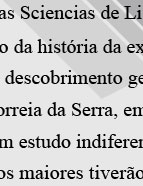

................................
Indeed, in international terms, as the end of the 19th century approached, the historiographical debate was energised by the opposition between two currents. The positivists were on one side, following Auguste Comte (1798–1857), and on the other the idealists, such as Wilhelm Windelband (1848–1915) and Heinrich Rickert (1863–1936). While the first school assigned the fundamental objectives of trying to discover new facts and eliminate error through historical criticism to historical research, the idealists, especially the Germans, highlighted a clear distinction between history and science. In their view, the historian should rely on intuition as an instrument and method of approaching the past. Thus, historicism, with its idealist roots, asserted itself through the distinction it made between the natural sciences and the sciences of the spirit, with History, naturally falling into the latter category. The natural sciences held objective knowledge and its explanation, while the sciences of the spirit stood out for the subjectivity and relativity of the knowledge of nature. Without a clear victor, the debate continued into the 20th century.
In the end, there was a kind of "agreement" between both sides. On methodological and theoretical levels, both currents shared concepts. The historical document was the written document, with textual criticism as the only valid methodology. The historical fact was understood as a unique, singular and fragmented phenomenon—the so-called event. Historical time was linear, continuous and irreversible—the succession of events. Finally, the historical subject was understood as the individual, voluntaristic being, personified by the great figure or hero—the actor of the event. In short, history was understood as a succession of important events, enacted over time by prominent figures. Alternatively, it may be said that history was thus perceived as merely recounting political facts that occurred chronologically and were sometimes linked without causal connection. History was reduced to the purest form of "événementiel."
